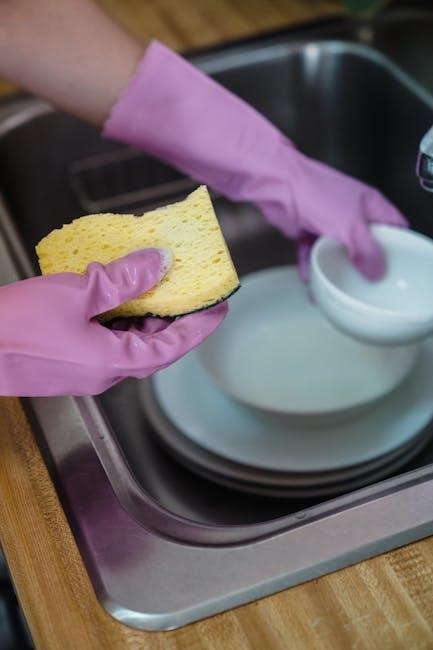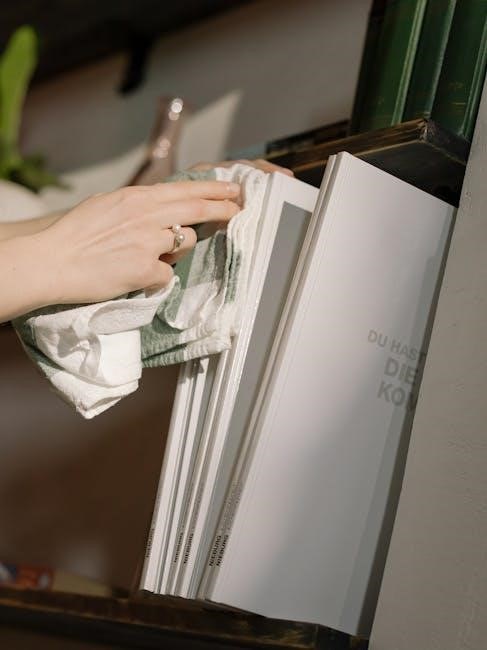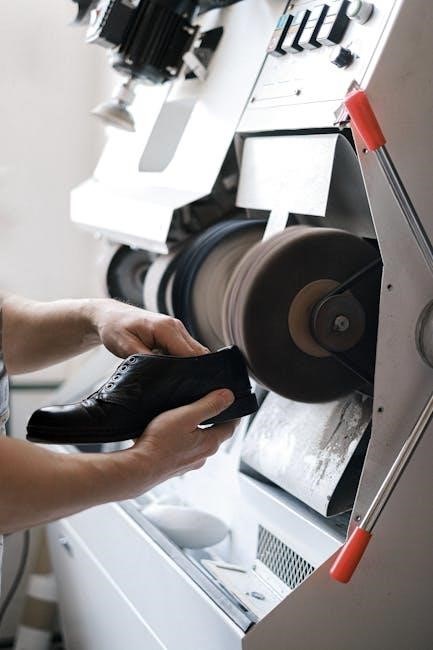Proper care ensures quartz surfaces retain their beauty and durability. Regular cleaning, stain removal, and long-term maintenance tips help preserve their elegance and investment value effectively.
Why Proper Care is Essential
Proper care is essential to maintain the beauty and durability of quartz surfaces. Regular maintenance prevents damage from spills, scratches, and etching, ensuring longevity. Quartz, while durable, is not indestructible, and neglect can lead to stains or dullness. Cleaning spills promptly and using the right products prevents permanent damage. Proper care also enhances hygiene, as quartz’s non-porous surface resists bacteria and germs when maintained correctly. By following simple care routines, you preserve the investment in your quartz countertops, keeping them looking like new for years. Consistent maintenance not only protects the material but also ensures it remains a stunning, functional feature in your home.
Daily Cleaning of Quartz Surfaces
Daily cleaning involves using warm water, mild dish soap, and a soft sponge or cloth. This routine maintains the surface’s shine and prevents damage effectively.
Recommended Cleaning Products

For daily cleaning, mild dish soaps like Dawn Ultra or Windex Multi-Surface Cleaner are ideal. A 50/50 vinegar-water mix is also effective. For tougher stains, pH-neutral cleaners like Mr. Clean or Simple Green are recommended. Avoid abrasive materials to prevent scratching. Always dilute cleaners as instructed to maintain surface integrity. Regular use of these products ensures quartz surfaces remain pristine and durable.
Step-by-Step Cleaning Process
- Gather a soft sponge, dishcloth, or microfiber cloth and warm water for daily cleaning.
- For routine maintenance, wipe down the quartz surface with a damp cloth to remove dust and debris.
- For tougher spots, mix a small amount of mild dish soap or pH-neutral cleaner with warm water.
- Apply the solution to the surface using a soft sponge or cloth, working in a circular motion.
- Rinse thoroughly with clean water to remove any soap residue.
- Dry the surface with a clean, lint-free cloth to prevent water spots.
This process ensures quartz surfaces remain clean, streak-free, and protected from damage.
Removing Stains from Quartz Countertops
For tough stains, apply a pH-neutral cleaner, let it sit, then scrub gently with a soft cloth. Avoid abrasive materials to prevent damage.
Oil-Based and Grease Stains
Oil-based and grease stains on quartz countertops can be effectively removed using pH-neutral cleaners or mild dish soap. For stubborn stains, apply the cleaning solution and let it sit for a few minutes before scrubbing gently with a soft sponge or cloth. Avoid using abrasive materials or harsh chemicals, as they may damage the surface. After cleaning, rinse thoroughly with warm water and dry the area to prevent water spots. Regular maintenance and prompt attention to spills will help keep your quartz surfaces looking like new and ensure their longevity. Always test a small area first to ensure the cleaner doesn’t damage the finish.
Food and Ink Stains
Food and ink stains on quartz surfaces can be addressed with prompt action. For food spills, gently scrub the area with a mild dish soap and warm water using a soft sponge or cloth. For ink stains, apply a pH-neutral cleaner or a solution of equal parts water and white vinegar. Let the solution sit for a few minutes before wiping clean. Avoid using bleach or abrasive cleaners, as they may dull the surface. Regular cleaning and sanitization practices will help maintain the quartz’s appearance and prevent stains from setting in. Always rinse thoroughly and dry the area to avoid water spots.
Long-Term Maintenance Tips
To maintain quartz surfaces long-term, avoid abrasive cleaners and harsh chemicals. Use pH-neutral products for sanitization and clean spills promptly. Prevent scratches with cutting boards and trivets.
Preventing Scratches and Etching
While quartz is highly durable, it’s not immune to scratches or etching. To prevent scratches, always use cutting boards and trivets for hot pans. Avoid abrasive cleaners or sponges, as they can dull the surface. For etching prevention, clean acidic spills like citrus or vinegar immediately, as they can damage the finish. Use non-abrasive cloths and pH-neutral cleaners to maintain the surface. Regularly sanitizing with mild soap and water also helps prevent etching. Never place sharp objects directly on quartz, and avoid dragging heavy appliances across the surface. By following these tips, you can preserve the glossy appearance and durability of your quartz surfaces.
Regular Sanitization Practices
Maintaining a clean and sanitized quartz surface is crucial for hygiene and durability. For everyday sanitization, use a mild dish soap diluted in warm water or a pH-neutral cleaner. Gently scrub the surface with a soft sponge or cloth, ensuring all areas are covered. Avoid harsh chemicals like bleach or ammonia, as they can damage the finish. After cleaning, rinse thoroughly and dry with a clean towel to prevent water spots. For tougher messes, mix equal parts water and white vinegar, apply to the area, and let it sit for a few minutes before wiping clean. Regular sanitization keeps your quartz surfaces germ-free and looking new.

Quartz vs. Granite: Care and Maintenance Comparison
Quartz and granite are popular countertop materials, each with unique care requirements. Granite is porous, needing periodic sealing to prevent stains and maintain its luster. Quartz, being non-porous, resists stains and doesn’t require sealing. Granite can withstand high heat, while quartz may be damaged by extreme temperatures. Daily cleaning for both involves mild soap and water, but granite demands extra attention against etching and scratches. Quartz offers easier maintenance overall, making it a low-fuss choice for busy households. Understanding these differences helps homeowners decide based on durability, aesthetics, and upkeep preferences. Both materials provide lasting beauty with proper care tailored to their needs.

Troubleshooting Common Issues
Common issues with quartz surfaces include stains, scratches, and etching. For stains, use pH-neutral cleaners or specialized stain removers. Scratches can be addressed with gentle polishing pads. Etching, often from acids, requires professional treatment. Avoid harsh chemicals and abrasive materials to prevent damage. Regular cleaning with mild detergents helps maintain the surface. For persistent problems, consult the manufacturer or a professional. Proper care ensures quartz retains its durability and appearance, addressing issues promptly prevents long-term damage.

Understanding Quartz Material Properties
Quartz is a non-porous, durable material resistant to scratches and heat. Its engineered composition makes it low maintenance and resistant to stains. Unlike natural stone, it doesn’t require sealing. Regular cleaning with mild detergents keeps it looking new. Avoid harsh chemicals and abrasive cleaners to prevent damage. Quartz’s non-porous nature prevents bacteria growth, making it ideal for kitchens and bathrooms. Proper care ensures it retains its beauty and functionality for years. Understanding its properties helps in maintaining its appearance and durability effectively.
In high-traffic zones, quartz surfaces require extra attention to maintain their appearance. Regular sanitization with pH-neutral cleaners prevents germ buildup. For stubborn stains, use mild detergents and soft sponges to avoid scratching. Avoid harsh chemicals like bleach or acid-based products. Dry surfaces thoroughly after cleaning to prevent water spots. Place coasters or trivets under hot items to shield from heat damage. Mats or rugs can reduce foot traffic impact. Promptly clean spills to avoid staining. Routine maintenance ensures longevity and preserves the elegance of quartz in busy environments. Consistency is key to maintaining its durability and aesthetic appeal over time. For effective quartz care, use mild dish soaps like Dawn Ultra or Windex Multi-Surface Cleaner. pH-neutral cleaners such as Mr. Clean or Simple Green are also ideal. A 50/50 vinegar and water mix is a cost-effective alternative. Avoid harsh chemicals like bleach or acid-based products, as they can damage the surface. Use soft, non-abrasive tools like microfiber cloths or sponges to prevent scratching. For stubborn stains, a white Scotch-Brite pad can be used gently. Regularly sanitize with a solution of equal parts water and white vinegar for a germ-free surface. Dry the area thoroughly after cleaning to prevent water spots. Always follow manufacturer instructions for optimal results.
Specialized Care for High-Traffic Areas
Recommended Cleaning Products and Tools
